Debate team grows, thrives in national circuit
The rise of the Friends Seminary Parliamentary debate team.
The debate team meets during a lunch practice. They host mock debates, review debate theories and techniques, and debrief two-sided issues during their meetings.
January 16, 2021
On a rainy Saturday morning in December, Lola Owett ʼ21 and Jamie Gall ʼ21 prepared to debate. As the opposition team, they had to refute their opponents’ claim that marriage as an institution should be abolished. Owett and Gall were the more experienced team. They are senior members of a Parliamentary debate team that’s currently ranked third in New York and tenth in the nation. They were debating against novices from Packer Collegiate.
Since the Friends Parliamentary debate team was founded by Kiran Singh ʼ20 three years ago, it has quickly become a force to be reckoned with. “We truly had to build it from the ground up,” Singh said. “No students at Friends had any experience debating whatsoever. It definitely took a lot of effort to catch up to schools that have had massive, really well-funded programs for years.”
Singh, along with co-leader Daniel Vebman ʼ19, organized meetings where students would debate each other on the spot. They had long conversations with debate faculty advisor and Head of the English Department, Katherine Olson, about what was going well and what wasn’t. They ran lunch sessions and after-school sessions.
“Daniel and Kiran were running these meetings that were kind of incredible,” Olson said. “I’ve never seen kids organized like that.”
Last year, Singh even arranged for Friends to host the largest Parliamentary debate tournament in New York. Within two years, the Friends team had gone from being non-existent to becoming one of the top five teams in the nation.
After graduating from Friends last year, Singh left a debate team that was poised to continue to succeed. This year, Owett and Charlie Gorrivan ʼ21 have become the leaders of the Friends team, which has continued to dominate in tournaments.
Suffice it to say, Owett and Gall thought they would win the round against Packer Collegiate.
After 15 minutes to deliberate, each side made their case. As opponents to ending marriage, Owett and Gall were the leader of the opposition and a member of the opposition respectively. As proponents of ending marriage, the two Packer Collegiate team members spoke as either the prime minister or a member of the government. After the back and forth of the round, the judge immediately declared her decision. Packer Collegiate had won.
“You can sound a bit intense at times,” the judge told Owett. The comment struck Owett and Gall as unfair: Debate rounds are normally judged on the basis of arguments – not speaking style. Owett went to speak to the equity officer who was in charge of ensuring that rounds are judged fairly.
The decision was reversed. Later in the day, the officer unreversed his decision. Then the next day, he re-reversed it. The winner of the round had been changed three times.
This confusing outcome was hardly the clear victory Owett and Gall had expected. According to Owett, this type of confusion is symptomatic of the way the New York Parliamentary Debate League (NYPDL) runs tournaments. “I would say there’s a lot of room for improvement in debate,” Owett said. “Especially in terms of trying to train judges on things, not only about how to judge a debate round, but in terms of equity.”
Judges are normally volunteer parents or students rather than professional debaters. These judges may not even know the rules of debate, or may only have been trained a few hours before. According to Gall, “some are not the most qualified people to be judges.” However, Owett said problems with judging are not a big issue. “It’s impossible to avoid all issues in a free high school debate tournament,” she said.
As a member of the NYPDL board, Owett has attended multiple meetings about how to ensure rounds are fair. Twice a year, representatives from each school in the national league meet to discuss their priorities for the coming year. Last meeting, they voted to focus on equity initiatives.
There are also issues in the judging of rounds that are difficult to control. “It’s not necessarily the fault of the people who run it,” Owett said. As a female debater, she says that she has faced many instances of misogyny. In her first debate, she lost a round against two male debaters. “I remember leaving the room and the way they were talking to me, it was very patronizing,” Owett said.
Olson also mentioned the dominance of boys in Parliamentary debate. “Debate can be very ‘bro-heavy,'” Olson said. “Even when we go to debate tournaments in the city, there are a lot of guys and the girls are very good, but it’s a boy-heavy culture.”
These types of issues also by no means define the experience of Friends debaters. Co-captains Owett and Gorrivan work to ensure the team’s success. During lunch periods, Gorrivan holds practice debates for novices. After school, Owett leads workshops for more advanced debaters. These workshops focus on debate strategies and various policy issues that could surface in rounds. Owett also reviews student results after debate tournaments. She uses these results to ensure that debaters who have been doing well are paired together. “What I want is not to have a bunch of teams that are going to do well because there’s one person doing all the work,” she said.
The long hours necessary for life as a Friends debater do not diminish its appeal for participants. “It’s so much more than something you put on your college application…” Owett said. “You really can develop your own speaking skills and it makes you a much better participant in the classroom.”
Tenzin Gund-Morrow ʼ22, a member of the team who is currently ranked eighth in New York, agreed. “I think that one of the most important skills you can have is being able to form your words as efficiently and effectively as possible to what you’re thinking,” Gund-Murrow said.
Debate has helped Gund-Murrow do that. “Now you can tell me something, and I’ll think about it and respond to it way faster,” he said.
Olson, who was a Pennsylvania state finalist in debate at high school, says she still uses the skills she learned in debate. “[The skills of debate] show you how to receive criticism publicly and not take it personally,” Olson said. “They show you how to speak in a group, they get you over concerns about public speaking.”
Debating also forces students to argue about issues they may know little about. Gund-Morrow remembers a time when he had to debate about soybean subsidies. Although he knew nothing about the topic, he was able to make an effective argument because he was able to “boil down the moral essence” of the issue. Gund-Morrow reads the news to prepare for debate, but he also takes the time to listen to college philosophy lectures. “Understanding why different philosophies are important will help you a lot in making effective arguments,” Gund-Morrow said.
Gall also emphasized the need for a knowledge base that stretches beyond politics in debate. “Parliamentary debate is usually about the logic and morality of things rather than actual facts,” she said. “Although, obviously everyone uses facts in their argument.”
According to various members of the team, Friends students are uniquely positioned to succeed in debate. “When you’re in English with Kate Olson and she spends hours above and beyond class time, meeting with students to ensure that their writing is persuasive, you inevitably become a better communicator,” Singh said.
Gall, Owett, Gund-Murrow, and Olson all expressed similar sentiments. “The way we’re taught to think through novels applies a lot to debate because it is a really clear step-by-step method,” Gall said.
There are other aspects of Friends as a school that debate team members feel give the team an advantage. Olson mentioned how often students speak publicly at Friends, in forums such as Meeting for Announcements. “I think that is enormously helpful in debate,” she said.
Owett summed up what she sees as the reason for the Friends debate team’s high success rate. “We started off in a way that didn’t just focus on debate terminology, but instead was about why does debate matter? And why is it good for us as individuals?” she said. “Because it helps us voice our opinions and it helps make us better members of society.”
For whatever reason, whether it be Friends as a school, the individual debaters, or just the diligent work every member puts in, the Friends debate team has been having a year of victories. Owett is working in the NYPDL from the inside, trying to ensure that debate rounds are fair to everyone. And, she and Gall are currently ranked 7th out of 73 teams in the state. She may have lost one battle, but she and the rest of the team are winning the war.




















